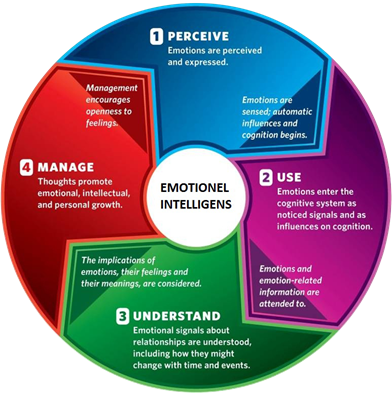MSCEIT
Mayer-Salovey-Caruso Emotional Intelligence Test
Emotional intelligence is essential for leaders, specialist and other key employees to navigate in a world of different personalities and tasks.
Mayer-Salovey-Caruso Emotional Intelligence Test (MSCEIT) is the first ability-based assessment of emotional intelligence, measuring a person’s capacity for reasoning with emotional intelligence. That is, it measures how well people perform tasks and solve emotional problems, rather than simply asking them, for example, about their subjective assessment of their emotional skills. The
MSCEIT was developed from an intelligence-testing tradition that was substantially informed by the emerging scientific understanding of emotions and their functions. The MSCEIT is a reliable and valid measure. This is the first measure that reports valid scores in each of the four central areas of emotional intelligence: The ability to (1) accurately perceive emotions; (2) use emotions to facilitate thinking, problem solving and creativity; (3) understand emotions; and (4) manage emotions for personal growth.
The Structure of the Assessment
The MSCEIT consists of 141 tasks, objectively measuring emotional intelligence and providing knowledge of how to solve problems with and about emotions.
The MSCEIT provides 15 main scores in four levels:
- Total Emotional Intelligence score
- – this score provides an overall index of the respondent’s emotional intelligence.
- Area scores
- An Experiential Emotional Intelligence score provides an index of the respondent’s ability to perceive emotional information, to relate to other sensations such as colour and taste, and to use it to facilitate thought.
- A strategic Emotional Intelligence score provides an index of the respondent’s ability to understand emotional information and use it strategically for planning and self-management.
- Branch scores
- A Perceiving Emotions score indicates the degree to which the respondent can identify emotion in himself or herself and others.
- A Facilitating Thought score indicates the degree to which the respondent can use his or her emotions to improve thinking.
- An Understand Emotions score indicates how well the respondent understands the complexities of emotional meanings, emotional transitions, and emotional situations.
- An Emotional Management score registers how well the respondent is able to manage emotions in his or her own life and the lives of others.
- Individual Task scores
- – provides supplemental test information in certain cases where it would be of value.

The four Branches:
- Identify or Perceive Emotions. The ability to accurately recognize emotions is the most basic EI skill. The better the emotional read you have on a situation, the more appropriately you can respond to it. It is difficult, if not impossible, to recover from faulty emotional data; basing actions on incorrect information is a recipe for disaster. You need to be aware of your own and others’ feelings and emotions in order to have accurate data and information about the world around you.
- Use Emotions (Using Emotions to Facilitate Thought). How we feel influences how we think. Using or generating emotions refers to knowing which moods are best for different situations, and “getting in the right mood.” More specifically, this skill allows you to employ your feelings to enhance the cognitive system (thinking) and, as such, can be harnessed for more effective problem-solving, reasoning, decision-making, and creative endeavors.
- Understand Emotions. Emotions contain information, and our ability to understand this information and think about it plays an important role in our day to day life. The first component of understanding emotions, includes knowledge of the emotional lexicon, including simple and complex emotion terms, and the ways in which emotions combine (anger and disgust form contempt), progress (annoyance to anger to rage), and transition to one another. This skill also involves the capacity to analyze emotions and their causes and the ability to predict how people will feel and react in different situations.
- Manage Emotions. The ability to regulate moods and emotions in oneself and in other people constitutes the fourth domain of EI. When managing one’s own feelings, people must be able to monitor, discriminate, and label their feelings accurately, believe that they can improve or otherwise modify these feelings, employ strategies that will alter their feelings, and assess the effectiveness of these strategies.


